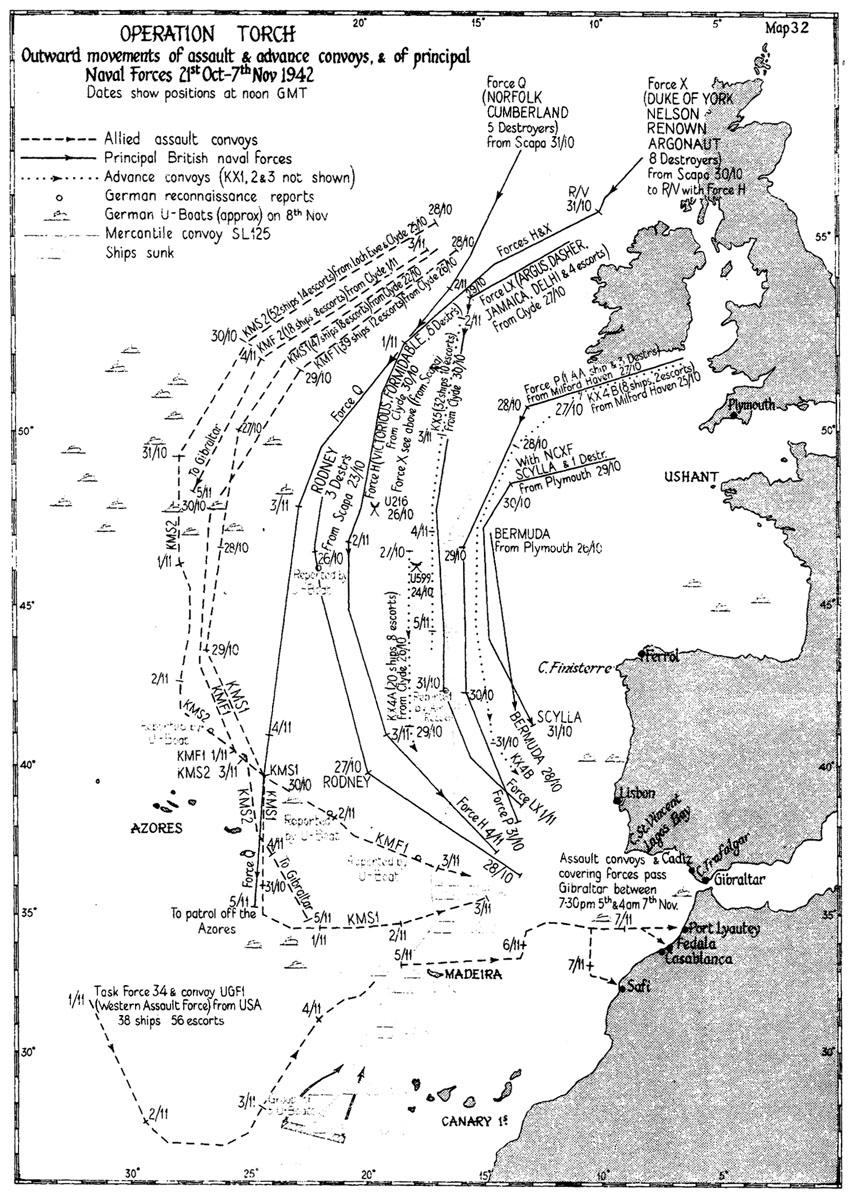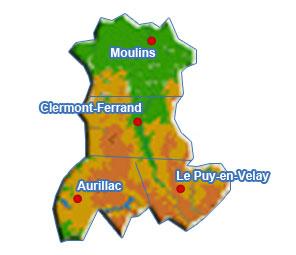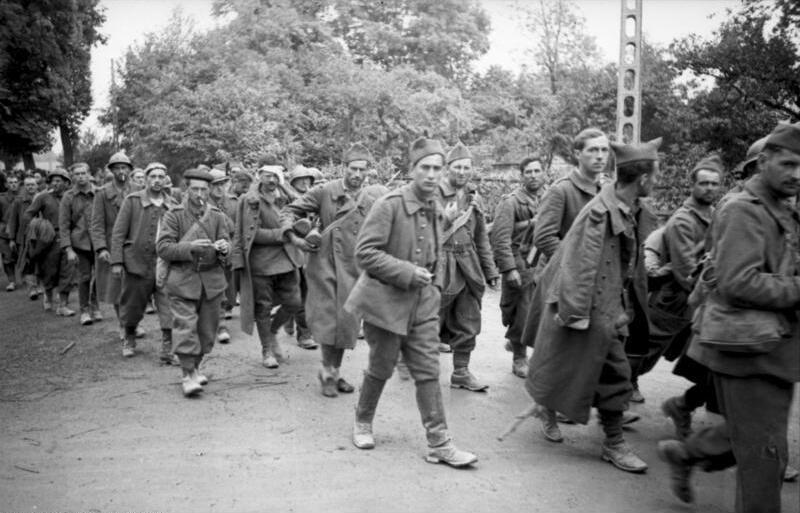|
German Occupation Of France In World War II
The Military Administration in France (german: Militärverwaltung in Frankreich; french: Occupation de la France par l'Allemagne) was an interim occupation authority established by Nazi Germany during World War II to administer the occupied zone in areas of northern and western France. This so-called ' was established in June 1940, and renamed ' ("north zone") in November 1942, when the previously unoccupied zone in the south known as ' ("free zone") was also occupied and renamed ' ("south zone"). Its role in France was partly governed by the conditions set by the Second Armistice at after the success of the leading to the Fall of France; at the time both French and Germans thought the occupation would be temporary and last only until Britain came to terms, which was believed to be imminent. For instance, France agreed that its soldiers would remain prisoners of war until the cessation of all hostilities. The "French State" (') replaced the French Third Republic that had ... [...More Info...] [...Related Items...] OR: [Wikipedia] [Google] [Baidu] |
Military Administration (Nazi Germany)
During World War II, Nazi Germany created Military occupation, military-led regimes in occupied territories which were known as a Military administration or Military administration authority (). These differed from ''Reichskommissariate'' which were led by Nazi Party officials. A ''Military administration'' was normally led by a "Commander, military commander" (, official acronym ''MilBfh.''). Ranks Officials of the ''Military administration'', regardless serving in the Wehrmacht, war economy, military education facilities, or in the Military occupation, military-led regimes in occupied territories, etc., wore military rank insignias similar to these of the Wehrmacht, characterised by the main Waffenfarbe, corps colour (de: Hauptfarbe) dark-green, and various secondary colours (de: Nebenfarben) as well. Here are a select few of ranks in the ''Military administration''. # General-senior-staff intendant (German language, de: Generaloberstabsintendant [equivalent OF8, three-star ... [...More Info...] [...Related Items...] OR: [Wikipedia] [Google] [Baidu] |
French Third Republic
The French Third Republic (french: Troisième République, sometimes written as ) was the system of government adopted in France from 4 September 1870, when the Second French Empire collapsed during the Franco-Prussian War, until 10 July 1940, after the Fall of France during World War II led to the formation of the Vichy government. The early days of the Third Republic were dominated by political disruptions caused by the Franco-Prussian War of 1870–1871, which the Republic continued to wage after the fall of Emperor Napoleon III in 1870. Harsh reparations exacted by the Prussians after the war resulted in the loss of the French regions of Alsace (keeping the Territoire de Belfort) and Lorraine (the northeastern part, i.e. present-day department of Moselle), social upheaval, and the establishment of the Paris Commune. The early governments of the Third Republic considered re-establishing the monarchy, but disagreement as to the nature of that monarchy and the rightfu ... [...More Info...] [...Related Items...] OR: [Wikipedia] [Google] [Baidu] |
Normandy Landings
The Normandy landings were the landing operations and associated airborne operations on Tuesday, 6 June 1944 of the Allied invasion of Normandy in Operation Overlord during World War II. Codenamed Operation Neptune and often referred to as D-Day, it was the largest seaborne invasion in history. The operation began the liberation of France (and later western Europe) and laid the foundations of the Allied victory on the Western Front. Planning for the operation began in 1943. In the months leading up to the invasion, the Allies conducted a substantial military deception, codenamed Operation Bodyguard, to mislead the Germans as to the date and location of the main Allied landings. The weather on D-Day was far from ideal, and the operation had to be delayed 24 hours; a further postponement would have meant a delay of at least two weeks, as the invasion planners had requirements for the phase of the moon, the tides, and the time of day that meant only a few days each month w ... [...More Info...] [...Related Items...] OR: [Wikipedia] [Google] [Baidu] |
Liberation Of France
The liberation of France in the Second World War was accomplished through diplomacy, politics and the combined military efforts of the Allied Powers, Free French forces in London and Africa, as well as the French Resistance. Nazi Germany invaded France in May 1940. Their rapid advance through the undefended Ardennes caused a crisis in the French government; the French Third Republic dissolved itself in July, and handed over absolute power to Marshal Philippe Pétain, an elderly hero of World War I. Pétain signed an armistice with Germany with the north and west of France under German military occupation. Pétain, charged with calling a Constitutional Authority, instead established an authoritarian government in the spa town of Vichy, in the southern '' zone libre'' ("free zone"). Though nominally independent, Vichy France became a collaborationist regime and was little more than a Nazi client state that actively participated in Jewish deportations. Even before France s ... [...More Info...] [...Related Items...] OR: [Wikipedia] [Google] [Baidu] |
French North Africa
French North Africa (french: Afrique du Nord française, sometimes abbreviated to ANF) is the term often applied to the territories controlled by France in the North African Maghreb during the colonial era, namely Algeria, Morocco and Tunisia. In contrast to French West Africa and French Equatorial Africa which existed as federations of French colonies and administrative entities in their own right, French North Africa was never more than a term of convenience to refer to the three separately governed territories under different forms of colonial regime. In the 19th century, the decline of the Ottoman Empire, which had loosely controlled the area since the 16th century, left the region vulnerable to other forces. In 1830, French troops captured Algiers and from 1848 until independence in 1962, France treated Algeria as an integral part of France, the ''Métropole'' or metropolitan France. In subsequent decades, a substantial European settler population emerged in Algeria k ... [...More Info...] [...Related Items...] OR: [Wikipedia] [Google] [Baidu] |
Operation Torch
Operation Torch (8 November 1942 – 16 November 1942) was an Allied invasion of French North Africa during the Second World War. Torch was a compromise operation that met the British objective of securing victory in North Africa while allowing American armed forces the opportunity to engage in the fight against Nazi Germany on a limited scale. It was the first mass involvement of US troops in the European–North African Theatre, and saw the first major airborne assault carried out by the United States. While the French colonies were formally aligned with Germany via Vichy France, the loyalties of the population were mixed. Reports indicated that they might support the Allies. American General Dwight D. Eisenhower, supreme commander of the Allied forces in Mediterranean Theater of Operations, planned a three-pronged attack on Casablanca (Western), Oran (Center) and Algiers (Eastern), then a rapid move on Tunis to catch Axis forces (Afrika Korps) in North Africa from the ... [...More Info...] [...Related Items...] OR: [Wikipedia] [Google] [Baidu] |
De Facto
''De facto'' ( ; , "in fact") describes practices that exist in reality, whether or not they are officially recognized by laws or other formal norms. It is commonly used to refer to what happens in practice, in contrast with '' de jure'' ("by law"), which refers to things that happen according to official law, regardless of whether the practice exists in reality. History In jurisprudence, it mainly means "practiced, but not necessarily defined by law" or "practiced or is valid, but not officially established". Basically, this expression is opposed to the concept of "de jure" (which means "as defined by law") when it comes to law, management or technology (such as standards) in the case of creation, development or application of "without" or "against" instructions, but in accordance with "with practice". When legal situations are discussed, "de jure" means "expressed by law", while "de facto" means action or what is practiced. Similar expressions: "essentially", "unofficial", " ... [...More Info...] [...Related Items...] OR: [Wikipedia] [Google] [Baidu] |
Vichy France
Vichy France (french: Régime de Vichy; 10 July 1940 – 9 August 1944), officially the French State ('), was the Fascism, fascist French state headed by Marshal Philippe Pétain during World War II. Officially independent, but with half of its Metropolitan France, territory occupied under harsh terms of the Armistice of 22 June 1940, armistice, it adopted a policy of collaboration with Nazi Germany, which Occupation of France by Nazi Germany, occupied the northern and western portions before occupying the remainder of Metropolitan France in November 1942. Though Paris was ostensibly its capital, the collaborationist Vichy government established itself in the resort town of Vichy in the unoccupied "Free Zone" (), where it remained responsible for the civil administration of France as well as its French colonial empire, colonies. The Third French Republic had begun the war in September 1939 on the side of the Allies of World War II, Allies. On 10 May 1940, it was Invasion o ... [...More Info...] [...Related Items...] OR: [Wikipedia] [Google] [Baidu] |
Auvergne
Auvergne (; ; oc, label= Occitan, Auvèrnhe or ) is a former administrative region in central France, comprising the four departments of Allier, Puy-de-Dôme, Cantal and Haute-Loire. Since 1 January 2016, it has been part of the new region Auvergne-Rhône-Alpes.. The administrative region of Auvergne is larger than the historical province of Auvergne, one of the seven counties of Occitania, and includes provinces and areas that historically were not part of Auvergne. The Auvergne region is composed of the following old provinces: * Auvergne: departments of Puy-de-Dôme, Cantal, northwest of Haute-Loire, and extreme south of Allier. The province of Auvergne is entirely contained inside the Auvergne region * Bourbonnais: department of Allier. A small part of Bourbonnais lies outside Auvergne, in the neighbouring Centre-Val de Loire region (south of the department of Cher). * Velay: centre and southeast of department of Haute-Loire. Velay is entirely contained inside the Auver ... [...More Info...] [...Related Items...] OR: [Wikipedia] [Google] [Baidu] |
Vichy
Vichy (, ; ; oc, Vichèi, link=no, ) is a city in the Allier department in the Auvergne-Rhône-Alpes region of central France, in the historic province of Bourbonnais. It is a spa and resort town and in World War II was the capital of Vichy France from 1940 to 1944. The term ''Vichyste'' indicated collaboration with the Vichy regime, often carrying a pejorative connotation. In 2021, the town became part of the transnational UNESCO World Heritage Site under the name " Great Spa Towns of Europe" because of its famous baths and its architectural testimony to the popularity of spa towns in Europe from the 18th through 20th centuries. Name Vichy is the French form of the Occitan name of the town, ', of uncertain etymology. Dauzat & al. have proposed that it derived from an unattested Latin name (') referencing the most important regional landowner (presumably a "Vippius") during the time of the Roman emperor Diocletian's administrative reorganizations and land surveys ... [...More Info...] [...Related Items...] OR: [Wikipedia] [Google] [Baidu] |
Paris
Paris () is the capital and most populous city of France, with an estimated population of 2,165,423 residents in 2019 in an area of more than 105 km² (41 sq mi), making it the 30th most densely populated city in the world in 2020. Since the 17th century, Paris has been one of the world's major centres of finance, diplomacy, commerce, fashion, gastronomy, and science. For its leading role in the arts and sciences, as well as its very early system of street lighting, in the 19th century it became known as "the City of Light". Like London, prior to the Second World War, it was also sometimes called the capital of the world. The City of Paris is the centre of the Île-de-France region, or Paris Region, with an estimated population of 12,262,544 in 2019, or about 19% of the population of France, making the region France's primate city. The Paris Region had a GDP of €739 billion ($743 billion) in 2019, which is the highest in Europe. According to the Economis ... [...More Info...] [...Related Items...] OR: [Wikipedia] [Google] [Baidu] |
French Prisoners Of War In World War II
During World War II, the French prisoners of war were primarily soldiers from France and its colonial empire captured by Nazi Germany. Although no precise estimates exist, the number of French soldiers captured during the Battle of France between May and June 1940 is generally recognised around 1.8 million, equivalent to around 10 percent of the total adult male population of France at the time. After a brief period of captivity in France, most of the prisoners were deported to Germany. In Germany, prisoners were incarcerated in ''Stalag'' or '' Oflag'' prison camps, according to rank, but the vast majority were soon transferred to work details ('' Kommandos'') working in German agriculture or industry. Colonial prisoners, however, remained in camps in France with poor living conditions as a result of Nazi racial ideologies. During negotiations for the Armistice of 22 June 1940, the Vichy French government adopted a policy of collaboration in hopes for German concessions ... [...More Info...] [...Related Items...] OR: [Wikipedia] [Google] [Baidu] |



.jpg)



